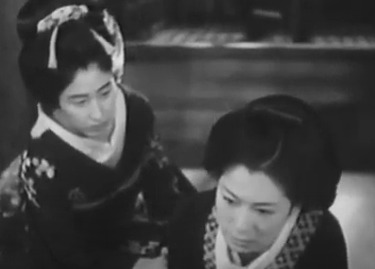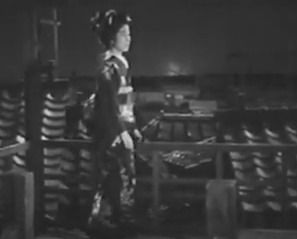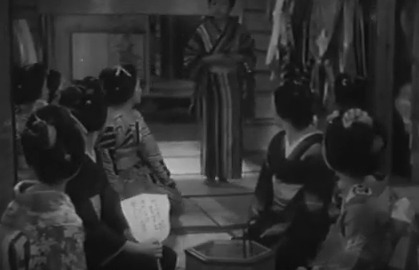Hana Chirinu, or Fallen Blossoms, is a Japanese period drama film directed by Tamizo Ishida in 1939. The film stars Ranko Hanai as Akira. The film follows a geisha house in Gion, Kyoto just as a civil war approaches. The latter half of the film takes place during the Kinmon Incident, in which the conflict between the Choshu rebel samurai and the Tokugawa Shogunate came to a climax. Our protagonist, Akira finds herself at the center of the conflict when her lover, a choshu, seemingly disappears and her mother is taken away for interrogation after fighting breaks outside their door. Hana Chirinu.




*May Contain Spoilers*
Not to exagerate, but this film changed my brain chemistry. For me, this film isn't just about a oncoming war, but about being able to have a pursuit of your own. Akira is mentioned to have recieved a proposal from a man named Teshihana in a scene featuring her mother and another character. Akira does not want to marry this man, however she still feels pressure to do so from her mother. There is another scene (my favorite) in which Akira reads from a poem she recieved from her lover. The poem is actually a poem written by Yanagiwara Byakuren, a very famous and controverisal socialite during the Taisho and Showa era. It reads, "As I recall my life, I look up at the moon and realize even it has a shadow. Why should I have any regret for the life I've lead?". I will not speak about it in depth here, but considering the life Yanagiwara lead as well as the contents of the film and poem, it is very clear wby this was included. In a conversation Akira has with Miyako (the servant/ apprentince), she tells her "There are many people outside the Kuruwa (geisha/entertainment district), so many different lives and ways of living. I want to go live amongst them." and "You know I've wanted to leave for a long time now. Then he appeared and showed me a way of life not like here.". She laments that those who came before her were able to do very little with their lives being born into the geisha house, and if she stays, her life will be the same. When fighting breaks out outside their doors, she attempts to open the door thinking it might be here lover, but is stopped by her mother. The day after, her mother is called away by the Shinsengumi (Kyoto Police) she tries to follow her but is told to stay and her mother tells everyone in the house that if things become dangerous, they must all evacuate. However, Akira refuses to evacuate with the rest and stays behind at the house. At the end, she walks up to the watchtower, her lovers poem in hand, as she waits for her mother.
Honorable mentions
Tanehachi is, in my opinion, one of the best characters in this film. Tanehachi is a very troubled alcoholic who quote "drifted here from Edo". She works hard only to end up strangled by debt. It is revealed that she has a pimp whom she has ran away from several times but no matter how hard she tries, he always finds her. Her life is shown to be very unstable, constantly living in fear of being found and is shown to travel from house to house. Towards the end of the film, she returns to the house in a seemingly drunken or hungover state, she reveals to Akira that "Heres will I've run off to! This time I'll never be taken. Whatever may happen, I'll never be found! Because I'm going to die here!". In order to escape her pimp, she essentially commits suicide by surrendering herself, leaving him penniless in her wake.
To learn more HTML/CSS, check out these tutorials!